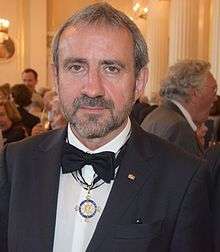Hermann Parzinger

Hermann Parzinger

Dmitry Medvedev and Hermann Parzinger
Hermann Parzinger (born 12 March 1959) is a German historian who is a specialist in the culture of the Scythians. He has been president of the Prussian Cultural Heritage Foundation since 1 March 2008.[1]
Honours and awards
- Since 1996 honorary professor at the Institute of Prehistoric Archaeology of the Freie Universität Berlin
- 1998 Leibniz Prize (highest endowed German research, which for the first time went to an archaeologist).
- Numerous scientific honors, including the honorary doctorates of the Siberian Branch of the Russian Academy of Sciences in Novosibirsk and the Russian Academy of Sciences in Moscow and honorary diplomas of the Republic of Tuva and the Mongolian Academy of Sciences.
- Honorary member of the Archaeological Institute of the Romanian Academy of Sciences in Iasi.
- In 2008 Hermann Parzinger was made an honorary citizen of his hometown Germering.[2]
- On 4 November 2009 Parzinger awarded in a ceremony at the Kremlin by Russian President Dmitry Medvedev the Order of Friendship, the highest Russian award for foreign citizens. He was also awarded in the German-Russian scientific and cultural relations that lead him for decades regularly to Russia for his outstanding scientific achievements and its multiple commitments.
- 2011 awarded the Heidelberg Academy of Sciences Hermann Parzinger the Reuchlin Prize of the city of Pforzheim (named after the humanist Johannes Reuchlin, who was born in 1455 in Pforzheim). The Heidelberg Academy justified this choice, among other things, that Hermann Parzinger have opened up with his time and transnational approach to research new territory for archeology and strengthened the importance of the humanities in the public consciousness.
- On May 29, 2011, the Chapter of the Order elected Pour le Mérite Parzinger added to its domestic members.
- On October 4, 2012 Parzinger received the Great Cross of Merit with Star of Merit of the Federal Republic of Germany[3]
- 2013, Parzinger of the Academy of Sciences and Literature in Mainz the first ever Kalkhof-Rose Academy Award.[4]
- 2013 Parzinger was a member of the American Philosophical Society elected, the oldest learned society of the United States. Thus, the company pays a special tribute that he initiated in cooperation with Russian archaeologists and his extensive publication record and his outstanding work as a cultural manager.
- 2014 he was elected Honorary Member of the American Academy of Arts and Sciences.[5]
- On September 14, 2015 Parzinger was awarded the Order of Merit of the Italian Republic (Ordine al Merito della Repubblica Italiana - OMRI) Award.[6]
Selected publications
- Chronologie der Späthallstatt- und Frühlatene-Zeit. Studien zu Fundgruppen zwischen Mosel und Save. Weinheim 1988. ISBN 3-527-17533-4 (Quellen und Forschungen zur prähistorischen und provinzialrömischen Archäologie Bd. 4)
- mit Rosa Sanz: Die Oberstadt von Hattuşa. Hethitische Keramik aus dem zentralen Tempelviertel. Funde aus den Grabungen 1982–1987. Berlin 1992. ISBN 3-7861-1656-3 (Boğazköy-Hattuşa Bd. 15)
- Studien zur Chronologie und Kulturgeschichte der Jungstein-, Kupfer- und Frühbronzezeit zwischen Karpaten und Mittlerem Taurus. Zabern, Mainz 1993. ISBN 3-8053-1501-5 (Römisch-Germanische Forschungen Bd. 52)
- Der Goldberg. Die Metallzeitliche Besiedlung. Zabern, Mainz 1998. ISBN 3-8053-2463-4 (Römisch-Germanische Forschungen Bd. 57)
- mit Rosa Sanz: Das Castro von Soto de Bureba. Archäologische und historische Forschungen zur Bureba in vorrömischer und römischer Zeit. Rahden/Westf. 2000. ISBN 3-89646-014-5.
- mit Viktor Zajbert, Anatoli Nagler, Alexander Plesakov: Der große Kurgan von Bajkara. Studien zu einem skythischen Heiligtum. Zabern, Mainz 2003. ISBN 3-8053-3273-4 (Archäologie in Eurasien Bd. 16)
- mit Necmi Karul, Zeynep Eres, Mehmet Özdoğan: Aşağı Pınar I. Zabern, Mainz 2003. (Archäologie in Eurasien Bd. 15 / Studien im Thrakien-Marmara-Raum Bd. 1)
- mit Nikolaus Boroffka: Das Zinn der Bronzezeit in Mittelasien I. Die siedlungsarchäologischen Forschungen im Umfeld der Zinnlagerstätten (Archäologie in Iran und Turan Bd. 5), Zabern, Mainz 2003, ISBN 3-8053-3135-5; ausführliche Rezension von Sören Stark in Orientalistische Literaturzeitung Band 105, 2010, Heft 1, S. 97–104.
- Die Skythen. Beck'sche Reihe 2342, München 2004. ISBN 3-406-50842-1.
- mit Heiner Schwarzberg: Aşağı Pınar II. Die mittel- und spätneolithische Keramik. Zabern, Mainz 2005. ISBN 3-8053-3541-5 (Archäologie in Eurasien Bd. 18 / Studien im Thrakien-Marmara-Raum Bd. 2)
- Die frühen Völker Eurasiens. Vom Neolithikum zum Mittelalter. Verlag C.H. Beck, München 2006. ISBN 3-406-54961-6.
- mit Wilfried Menghin, Manfred Nawroth und Anatoli Nagler (Hrsg.): Im Zeichen des Goldenen Greifen. Königsgräber der Skythen. Prestel Verlag, München 2007.
- mit Konstantin V. Tschugunov und Anatoli Nagler: Der Goldschatz von Arschan. Schirmer/Mosel, München 2006. ISBN 3-8296-0260-X.
- Gero von Merhart, Daljóko. Bilder aus sibirischen Arbeitstagen. Böhlau-Verlag, Wien, Köln, Weimar 2009.
- mit Thomas Flierl (Hrsg.): Humboldt-Forum Berlin. Das Projekt. Verlag Theater der Zeit, Berlin 2009.
- mit Konstantin V. Tschugunov und Anatoli Nagler: Der skythenzeitliche Fürstenkurgan von Arschan 2 in Tuva. Zabern, Mainz 2010. (Archäologie in Eurasien Bd. 26 / Steppenvölker Eurasiens Bd. 3)
- Die Kinder des Prometheus. Eine Geschichte der Menschheit vor der Erfindung der Schrift. 848 S. mit 110 Abbildungen und 19 Karten, größtenteils farbig. C. H. Beck Verlag München 2015, 4. Aufl. 2015 ISBN 978-3-406-66657-5.
References
- ↑ http://theartnewspaper.com/news/news/berlin-s-lost-renaissance-sculptures-rediscovered-in-the-pushkin-museum/?
- ↑ "Stadt ist stolz auf ihren erfolgreichen Sohn". 21 December 2008. Retrieved 5 July 2016.
- ↑ "Hermann Parzinger erhält das Große Verdienstkreuz mit Stern". Retrieved 5 July 2016.
- ↑ "Parzinger erhält Akademie-Preis für Geisteswissenschaften". 27 February 2013. Retrieved 5 July 2016 – via Welt Online.
- ↑ https://www.amacad.org/content/system/search.aspx?s=Parzinger
- ↑ "Italien ehrt Hermann Parzinger - Stiftung Preußischer Kulturbesitz". Retrieved 5 July 2016.
External links
![]() Media related to Hermann Parzinger at Wikimedia Commons
Media related to Hermann Parzinger at Wikimedia Commons
This article is issued from Wikipedia - version of the 12/1/2016. The text is available under the Creative Commons Attribution/Share Alike but additional terms may apply for the media files.